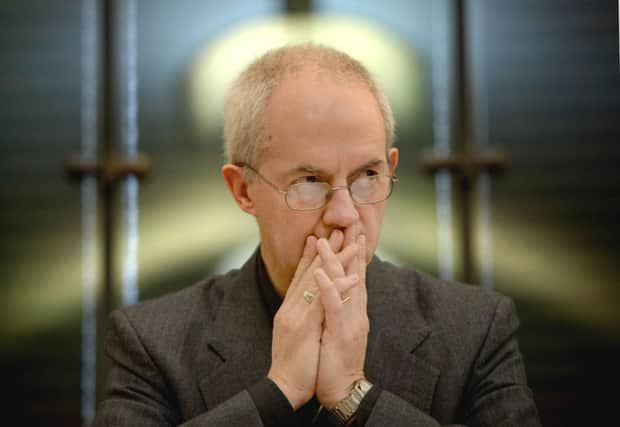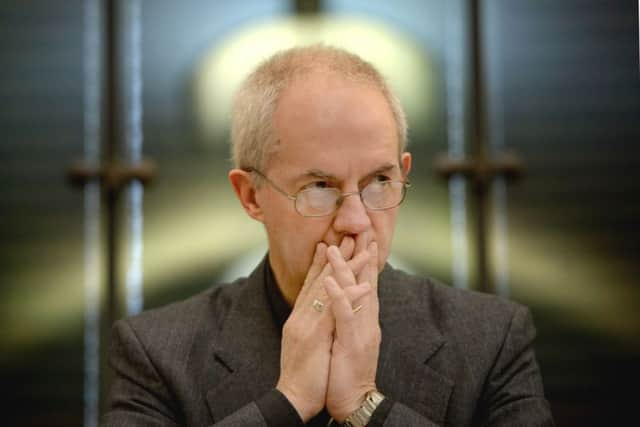Poor people go hungry because they can’t cook, hints Tory peer


Baroness Jenkin of Kennington made the controversial claim at the House of Commons launch of the Feeding Britain report, which called for action from the Government, supermarkets and “rip-off” utility companies to stem the rising tide of poor households seeking help from food banks.
David Cameron said there were “elements” of the report that the Government would “want to take forward”, but there was no immediate response to a plea from the Archbishop of Canterbury for £100,000 in state money to kick-start a new organisation designed to eliminate hunger in the UK by 2020.
Advertisement
Hide AdAdvertisement
Hide AdArchbishop Justin Welby, who will be president of the new Feeding Britain group, said it was “shocking” to see thousands of people in a wealthy country reduced to seeking food handouts, and told the launch meeting that its proposals to end hunger were “eminently practical and not unreasonably expensive”.


Lady Jenkin, who served on the inquiry team that produced the document, said hunger stemmed in part from the disappearance of the knowledge needed to create cheap and nourishing meals.
“We have lost our cooking skills,” said the peer - the wife of Conservative MP Bernard Jenkin. “Poor people don’t know how to cook.
“I had a large bowl of porridge today, which cost 4p. A large bowl of sugary cereals will cost you 25p.”
Advertisement
Hide AdAdvertisement
Hide AdShe later acknowledged that her words had been badly chosen and said she was trying to get across the message that home-cooked meals are often cheaper and more nutritious than packaged food.
She told BBC Radio 4’s World At One: “What I meant was as a society we have lost our ability to cook. That seems no longer to be handed down in the way that it was by previous generations.
“I am well aware that I made a mistake in saying it and apologise to anybody who’s been offended by it.
“The point is valid. If people today had the cooking skills that previous generations had, none of us would be eating so much pre-prepared food.”
Advertisement
Hide AdAdvertisement
Hide AdThe Church of England-backed Feeding Britain report identifies delays in welfare payments and sanctioning of claimants as key factors driving disadvantaged households to food banks. It also criticised supermarkets for destroying surplus food instead of donating it to charities and utility companies for charging premium rates to poorer customers.
Minister for civil society Rob Wilson told the meeting that Government departments would “be reflecting carefully on each of the recommendations made in the report” and would “engage” with Feeding Britain as its takes its proposals forward.
The Prime Minister, speaking during a visit to a south London school, said: “We will study the report and see what we can bring forward.
“But it comes at a time when the economy is growing and we are lifting people into work and out of poverty.”
Advertisement
Hide AdAdvertisement
Hide AdLabour employment spokesman Stephen Timms criticised the Department for Work and Pensions for failing to send a minister to respond to the report, telling the meeting it was clear that Government welfare policies had been “a contributory factor” in the growing reliance on food banks.
Inquiry co-chairman Frank Field stressed that the report was non-partisan, with MPs and peers from all sides of Parliament agreeing unanimously on its recommendations.
But Labour MP Emma Lewell-Buck stressed the role of changes to the welfare state under the coalition Government, which she said were “cited time and time again” by witnesses to the inquiry as a factor in driving food bank use.
“In the past we had a welfare state with a supportive safety net,” the South Shields MP told the meeting. “We no longer have that safety net. We have a harsh and punitive regime.
Advertisement
Hide AdAdvertisement
Hide Ad“It remains a national disgrace that food banks have become part of the fabric of our country, but thank God they are because without them people would be going hungry. One hungry person is an absolute disgrace, but thousands of hungry people are a national disaster.”
The All-Party Parliamentary Inquiry into Hunger in the UK found that, since the establishment of the Trussell Trust network in 2004, numbers of emergency food assistance providers have grown to at least 1,500, including 800 food banks - around half of them operated by the trust.
Citing evidence from the trust that its 420 food banks provided help to 913,138 people in 2013/14 - up from 128,697 in 2011/12 - the report said it was “clear that demand for emergency food assistance is increasing, and sometimes increasing dramatically”.
It said: “Although practically every respondent to this inquiry has asserted that the food bank movement should not form a new version of a residual or Poor Law kind of welfare state, it became clear from our evidence that food banks are here to stay - for more than the immediate future.”
Advertisement
Hide AdAdvertisement
Hide AdThe proportion of poorer households’ incomes which is swallowed up by housing cost, utilities and food has soared from 31% to 40% between 2003 and 2012, leaving them little margin to cope with emergency expenses, found the inquiry. Inflation has hit the poor harder than more comfortable households, due in part to “rip-off” deals which penalise those who are unable to settle bills by direct debit or pay for services in advance.
The inquiry team said its “anger knows no bounds” at the destruction - sometimes with state subsidies - of 4.3 million tonnes of edible food deemed “surplus” by the UK food industry each year, just 2% of which is diverted to charities to feed the hungry.
Many people turn to food banks to avoid hunger during “unimaginable” waits for benefit claims to be processed, while others are forced to ask for help after being left without an income for weeks or months because of benefit sanctions, said the report.
The Archbishop stressed that the Feeding Britain team was not asking the Government to fund and run food banks.
Advertisement
Hide AdAdvertisement
Hide AdBut he said it was “shocking” to witness people in Britain - rather than poorer parts of the world he had visited - queuing for food handouts: “How shocking it is to find this happening here ... I’ve seen much worse very recently, but happening here it is in the wrong place. We don’t do that in this country and we need to stop it.”
The inquiry’s co-chairman, Anglican Bishop of Truro Tim Thornton, said: “We believe it is time to look again at the state of our country and to review the fundamental values that led to the creation of our welfare state. We propose in Feeding Britain a strategy for renewing the welfare state so it can better reflect and encourage the relationships which contribute to the well-being of our citizens, including the poorest.”
He said supermarkets including Tesco, Sainsbury’s, Morrisons, Asda, the Co-op and Waitrose had already promised to take action in response to the report, along with utility regulators Ofwat and Ofcom.
Giving the Government’s response to the report, Mr Wilson said food banks were providing “an incredibly valuable service”, adding that the welfare system provided “a vital safety net” and that the administration’s “long-term economic plan” was helping bring down numbers of unemployed and boost growth.
Advertisement
Hide AdAdvertisement
Hide AdTUC general secretary Frances O’Grady said: “The Government is introducing what amounts to a ‘food banks first’ policy for anyone who loses their job or becomes too sick or disabled to work. It’s unrealistic and unfair to make new claimants wait five weeks or more before they receive any cash.
“While it is right to deal with people who abuse the system, ministers are now undermining the social security safety net that any of us might need. The Government’s welfare reforms are attacking people who have done nothing wrong at a time when they most need help.”